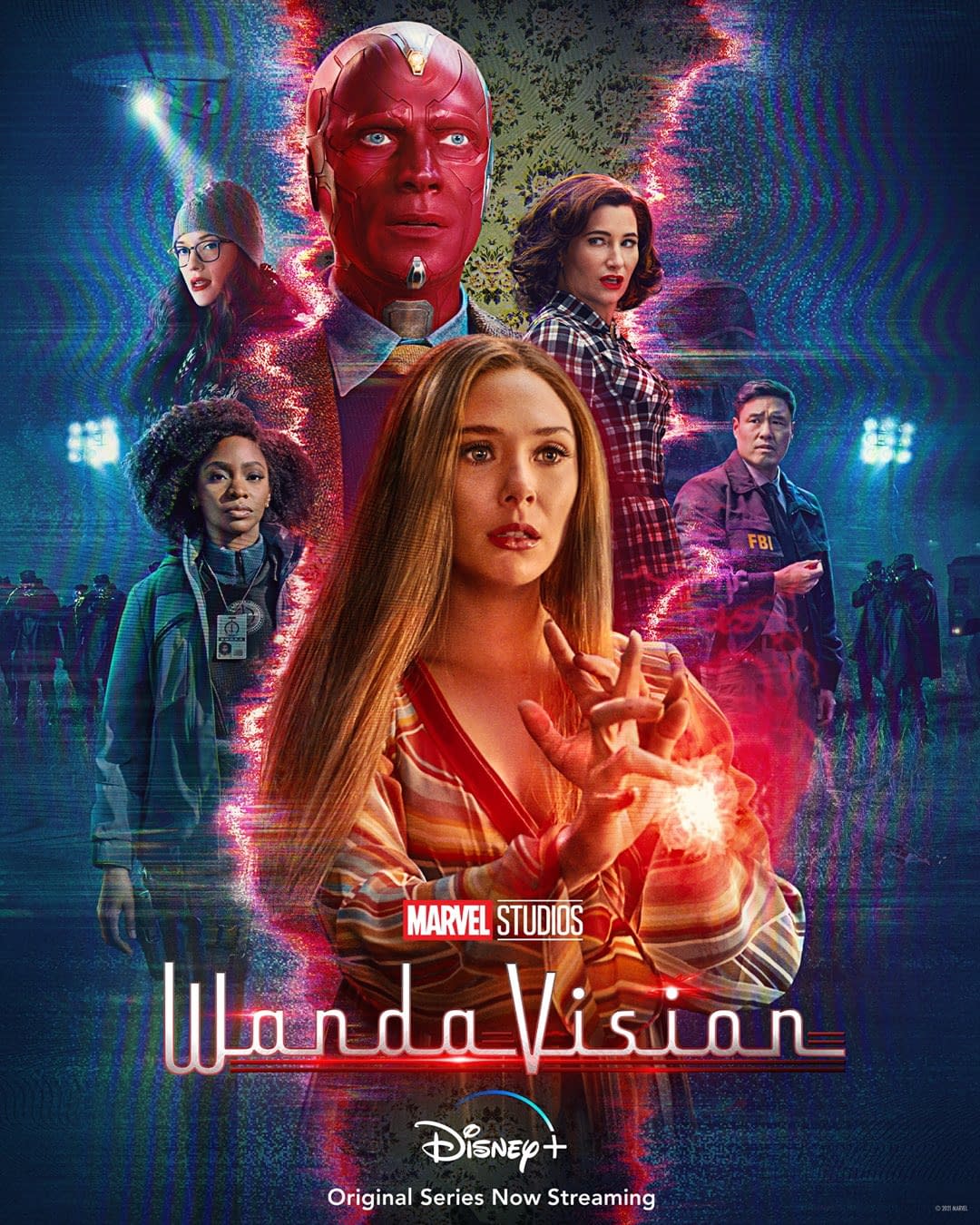“What is grief, if not love persevering?”
That’s a line that Vision says in a flashback from the penultimate episode of WandaVision. It’s also, essentially, the show’s thesis statements. I liked that line of dialogue a lot. Though I’ve always thought of grief being the love that remains once someone you care for is gone, I was never able to put it quite so succinctly. I have heard a number of other people say that line altered their perception of grief, so the impact is definitely real.
The impact of WandaVision is also very real, especially after an entire calendar year where forces beyond our control lead to there not being a Marvel movie released for the first time since 2009. The show was very well done, and I greatly enjoyed it. But I still must wonder whether it would have had such a large footprint on America’s entertainment culture had it been just one of three or four MCU projects that came out shortly after Avengers: Endgame.
Ultimately, it doesn’t matter, because the show very much stands on its own merits. However, due to the extraordinary circumstances surrounding its release, WandaVision was nothing, if not, the MCU persevering. Because, had it not been almost through production already when the pandemic hit, then we would have had to wait several more months before seeing anything or anyone from the MCU again. And, had it been a movie rather than a nine-episode TV series, it would not have satiated the viewers for nearly as long as it did.
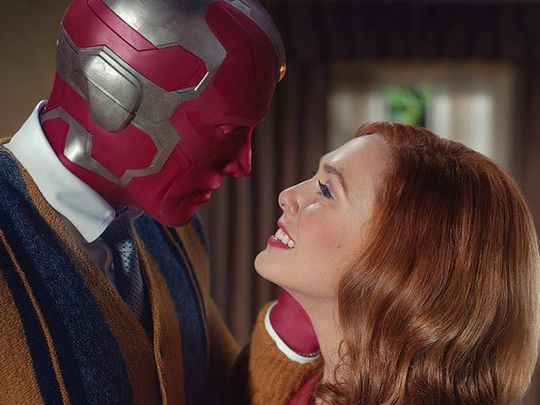
By design, the show took an extremely roundabout way to reach its own fairly straightforward conclusion. There were may twists, and feints, and trollings and red herrings. But, in the end, it was about how Wanda Maximoff was finally able to allow herself to properly grieve for her lost loved ones, and also get a proper superhero costume and name. Although, it’s safe to assume that she’ll be seeing Vision again with all his memories but none of his emotional attachments (or fancy colors). So that’ll be another curveball for her, when the time comes.
Emotional attachments are not something I ever had for Wanda or Vision. Even back in my youth when I was more regularly reading comics. I never had much interest in them. This was no different when it came to their cinematic interpretations. I enjoyed Paul Bettany as the voice of J.A.R.V.I.S, but his turns as Vision always left me cold.
He was a bit of a MacGuffin who transformed into a deus ex machina in Avengers: Age Of Ultron. I also rolled my eyes a bit when he became the first character besides Thor to lift Mjolnir. He had a little more to do in Captain America: Civil War, but was still little more than an afterthought to the primarily storyline. When he and Wanda were suddenly a couple in Avengers: Infinity War, it never rang as emotionally true to me. And, because of this, his death(s) at the end of that movie again felt simply like the means to an end.
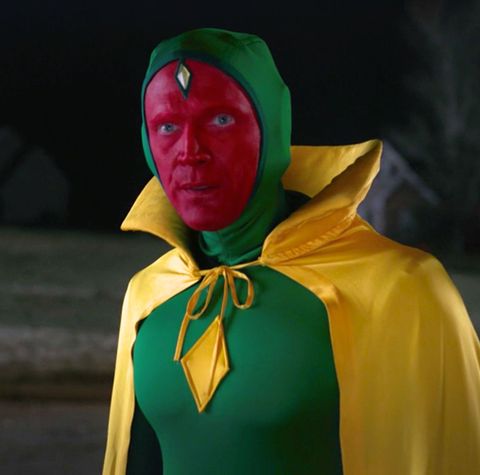
I was more on-board with Elizabeth Olsen’s Wanda Maximoff when she also debuted in Age Of Ultron. Unlike Vision, at least she had an interesting backstory. But even that was soured for me by the pointless, and underwhelming, death of Pietro in that film. I assumed it was a right issue, considering Fox still had the X-Men film rights at the time. But it was still a lame ending for a character with a great deal of potential. Really, the usage rate for Quicksilver was one of the very few things that Fox’s X-Men cinematic universe did better than the Marvel Cinematic Universe.
Wanda was the main catalyst at the starts of Civil War, due to her mistake on a mission with Captain America’s team leading to the deaths of civilians. By extension, her actions left to the writing of the Sokovia Accords. Her actions sequences – the opening, the fight with Vision, and the battle royal at the airport – were all pretty cool. But, by the end of Civil War, her part in the disassembling of the Avengers took a backseat to the Iron Man vs Captain America & The Winter Soldier fallout and rumble.
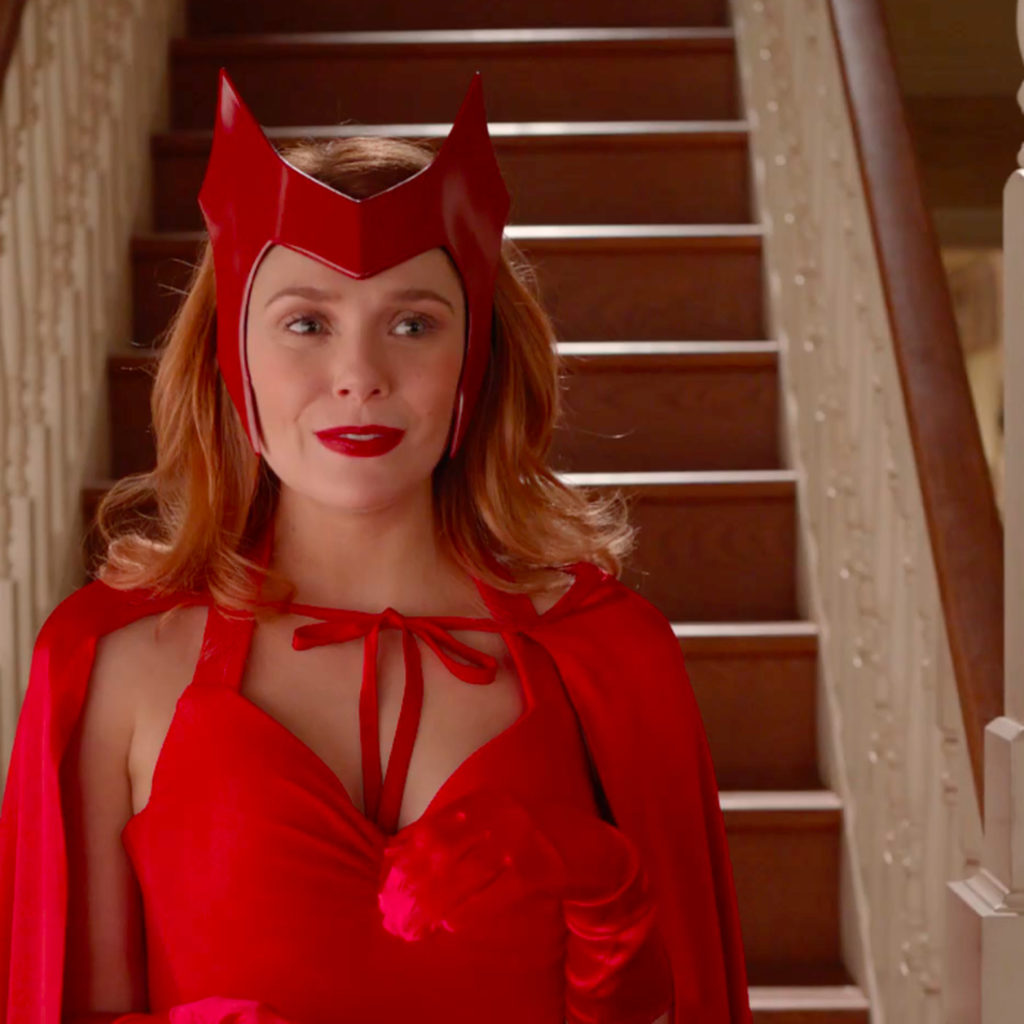
As I mentioned earlier, her scenes with Vision as a romantic pairing in Infinity War felt sudden, and unearned to me. Though her arrival on the battlefield in Wakanda was one of the action highlights of the film, alongside Team Cap’s arrival at the train station in Edinburgh, and Thor’s big Wakandan entrance. Wanda’s own return in Avengers: Endgame was better, as I felt her rage as a more realistic motivation than her love in the previous film. And she did nearly break Thanos in-half, which was also an impressive of power.
So, while I always found Wanda more interesting than Vision, she was still near the bottom of my list of characters I cared about. Until WandaVision. Giving Wanda and Vision 7+ hours to develop their relationship, even in as strange a way as they did, finally won me over to their storyline. In short – I never knew I wanted more of Wanda and Vision until I was given more of Wanda and Vision.
It helps when two characters that we are told are in-love actually have time to show us what their love looks like, be it in a domestic situation or otherwise. Also, just having more screen time than either did in the films allowed the actors to fill out the roles in a much more meaningful way. Bettany’s and Olsen’s talent, coupled with the creative team providing them top notch material, allowed this flex to happen.
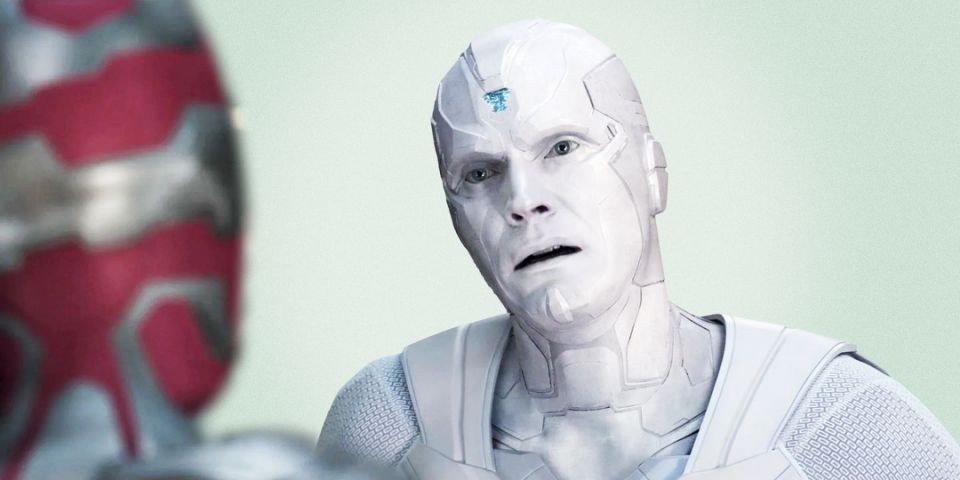
At the conclusion of the finale, there are primarily three threads left hanging to lead us forward to the next Phase of the MCU: Monica Rambeau’s emergence of superpowers, White Vision’s memory download and escape, and Wanda’s quest to hone her powers for seemingly one very specific reason.
I’m not going to spend much time on Monica, Agent Woo, or Darcy. As much as I enjoyed that part of the show, I’d rather focus on the titular characters. Monica’s introduction, and gaining of powers all pretty much led up to the mid-credits stinger, which involved a Skrull enlisting here to join Nick Fury and Talos on a space station as they venture into the upcoming Secret Invasion Disney+ series.
Woo and Darcy were just a lot of fun, and I very much hope to see more of them both. I figure Darcy will be in Thor: Love & Thunder, and Woo seems like he’ll be moving up in the FBI world, which ought to provide more chances to roll him out in future shows and movies.
White Vision seemed like he’d be a bigger deal in the penultimate episode than he ended up being. I’d be lying if I said I didn’t figure he’d be used as a tool to bring the original Vision back into the real world outside of the Hex that Wanda created. Still, it was a clever way to use a new character to bring back an old character, and then combine the two to be something different. I’ll be interested to see where White Vision next appears, and what his character is now that Vision loaded up his memory file.
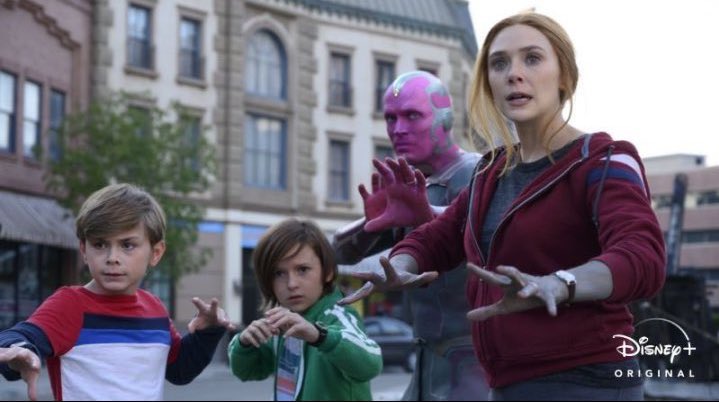
That leaves the last thread, and the most tragic piece of the finale: the fate of Billy and Tommy, the children who Wanda created for herself. What was interesting was that, even though they were manufactured whole-cloth by Wanda, they had personalities and, dare I say, souls independent of their “mother.”
At the end of her fight with Agatha Harkness – whom I didn’t mention, but was also pretty great – Wanda realizes that she needs to free the town of Westview from her Hex. This means losing Vision…for a third time…but he’s aware of this, prepared for it, and also knows that White Vision is out there somewhere carrying his life experience into the future.
Billy and Tommy, on the other hand, are put to bed and erased in heart-breaking fashion. Wanda’s response to this tragedy felt strangely underwhelming, considering the extreme way that her grief over her parents, brother, and lover manifested itself. I was confused by this until we got the second stinger at the end of the credits. In a scene that looks very Sam Raimi-esque, we see Wanda far out in the middle of nowhere, using the Doctor Strange pocket dimension learning strategy to train herself in the Chaos Magic found in the Darkhold – the “book of the damned” – recovered from Harkness’ creepy black magic cellar.
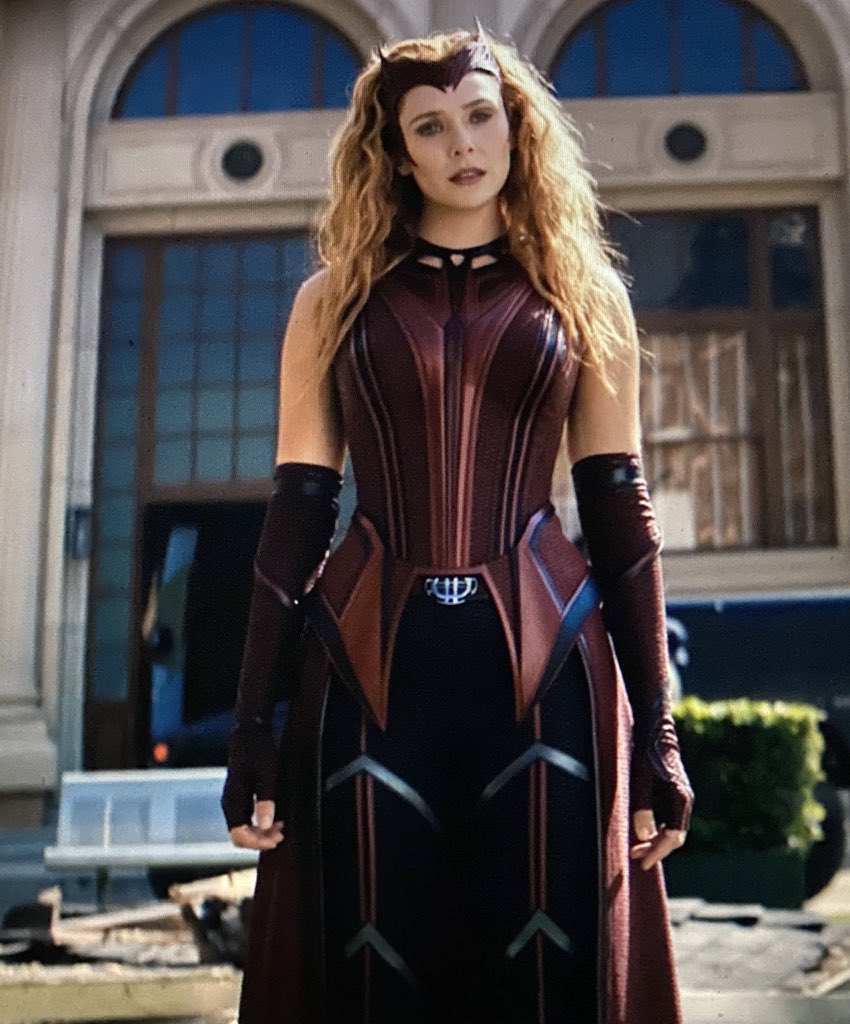
Upon first glance, one might assume she is simply learning how to better hone her magic skills to be a better Scarlet Witch. However, at the last moment we hear a little bit of what Wanda is hearing. And what she’s hearing is her children crying for help. If her existing, pent-up grief led an untrained uber-witch to accidentally enslave an entire town in her altered reality, imagine what the loss of her children will lead her to do on-purpose. Especially now that she’s determined to fully harness her power. Sounds to me like the perfect recipe for some multiversal madness. Paging Doctor Strange.
All-in-all WandaVision was a fascinating cocktail for the familiar (quick-witted jokes, bright colors, superpeople bombarding each other with energy blasts) and the different (the internal sitcoms-through-the-decades format, the TV series format in-general). In most cases, a living entity must evolve in order to survive, and this very much felt like the MCU’s evolution. So, I once again ask my own thesis: What is WandaVision, if not the MCU persevering?
